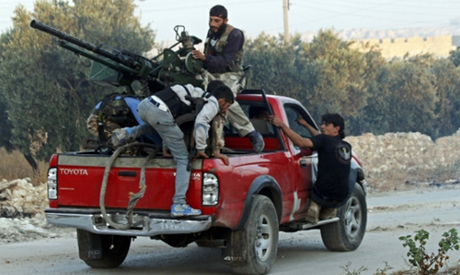 Powerful Syrian insurgent units have rejected the authority of the opposition Syrian National Coalition (SNC), badly damaging efforts by Western-backed political exiles to forge a moderate rebel military force on the ground.
Powerful Syrian insurgent units have rejected the authority of the opposition Syrian National Coalition (SNC), badly damaging efforts by Western-backed political exiles to forge a moderate rebel military force on the ground.Thirteen groups, including at least three previously considered part of the coalition's military wing, the Free Syrian Army (FSA), signed a statement calling for the opposition to President Bashar al-Assad to be reorganised under an Islamic framework and to be run only by groups fighting inside Syria.
The signatories range from hardliners such as the al Qaeda-linked Nusra Front and Ahrar al-Sham battalions to more moderate Islamist groups such as the Tawheed Brigade and Islam Brigade.
"These forces feel that all groups formed abroad without having returned to the country do not represent them, and they will not recognise them," said the statement read in an online video by Abdulaziz Salameh, the political leader of the Tawheed Brigade.
"Therefore the National Coalition and its transitional government led by Ahmad Tumeh do not represent them and will not be recognised," he said.
Western powers and their Gulf Arab allies had encouraged the SNC to lead a credible force within Syria under the FSA's banner and undercut Islamist militant groups piling into the conflict.
This effort to find a partner which the West and its allies could then back with weapons supplies could collapse if the rebel signatories hold their position - some groups have previously backed away from statements with hardline forces.
"If the statement proves to accurately represent the groups mentioned and they do not immediately fall apart again, it is a very big deal," wrote analyst Aron Lund on the blog Syria Comment.
"It represents the rebellion of a large part of the 'mainstream FSA' against its purported political leadership, and openly aligns these factions with more hardline Islamist forces."
CHRONIC INFIGHTING
Since the 2-1/2-year-old revolt against Assad began, Syria's opposition forces have been riven with factionalism and rivalries. There have also been tensions between Islamist groups and those that support a secular vision for a post-Assad Syria.
Charles Lister of IHS Jane's Terrorism and Insurgency Centre said the three moderate Islamist groups which signed the statement - the Tawheed Brigade, the Islam Brigade and Suqor al-Sham - had represented SNC's main rebel presence on the ground.
"The inclusion of the core of the SNC force...effectively depletes the SNC's armed wing, the Syrian Military Council," Lister said. "It is likely that the moderate Islamist coalition has ceased to exist as a single organisation structure."
Islamist forces grew in power as the Syrian conflict changed from peaceful protests into an armed insurgency after a fierce crackdown by Assad's forces. Militant groups, some linked to al Qaeda, have become even stronger in the ensuing civil war.
Many Islamist groups that do not share al Qaeda's ideology had maintained a pragmatic stance. But the statement indicates that Tawheed and others have closed ranks with hardliners on the ground rather than the Western- and Gulf-backed SNC abroad.
"These forces call on all military and civilian forces to unite under a clear Islamic framework based on Sharia law, which should be the sole source of legislation," the statement said.
One of the most radical groups fighting in Syria, al Qaeda's Islamic State of Iraq and the Levant, was not involved in the statement, although it was not immediately clear if that was its own choice or because the other groups deliberately excluded it.
Whatever their ideological background, many opposition groups inside Syria are sceptical and resentful of the SNC, a fractious umbrella organisation for opposition groups abroad.
Critics accuse it of not being transparent with funding and in its political processes. They say it is out of touch with people in Syria, where more than 100,000 have been killed and swathes of territory have been destroyed by combat and shelling.



